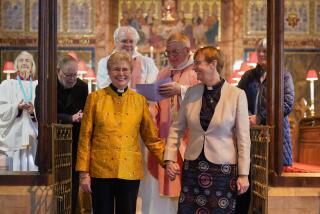âTheology After Googleâ conference takes look at religion in Web era
Like many Americans, Doug Pagitt grew up outside the world of organized religion. Neither his parents nor his grandparents were churchgoers, and there was no expectation that he would be any different. Today, with his goatee, ear stud and funky clothes, he could easily pass for the sort of Gen X hipster who lives an entirely secular life.
But at 17, Pagitt saw a Passion play that hit him like a thunderbolt, and he wound up becoming a Christian pastor. His church in Minneapolis, Solomonâs Porch, is blazing a trail in a new movement that could be called Church 2.0.
That was, in fact, one of the terms used last week during a three-day conference about the future of American Christianity at the Claremont School of Theology. Pagitt was among about 150 ministers, laypeople and academics who gathered to discuss âTheology After Google.â
The consensus: Itâs a whole new world out there. Churches will ignore it at their peril.
âI think things like denomination and ordination are part of the old system of control and domination that has to go,â Pagitt, 42, said as he relaxed after the conferenceâs first day at the Theo Pub set-up for participants. Around him, beer flowed and conversation leaped from Twitter to evangelism to church formation to corn toss, a beanbag game popular in the Midwest and Appalachia that is gaining a toehold among the theologians in Claremont.
The premise of the conference had been laid out earlier in the evening by Philip Clayton, a professor at Claremont who talked about the role of Gutenbergâs printing press in the 15th century. By making the Bible more widely available, he said, it democratized religion and led directly to the Protestant Reformation.
âLadies and gentlemen,â Clayton said, âwe are talking today about a transition equally as great.â
The Claremont school was founded by the United Methodist Church and serves as a seminary for Methodists and three other Protestant denominations. Theologically and culturally, the conference attendees leaned toward the liberal end of the spectrum. One theme that emerged was how smart the Christian right has been about using new media, and how progressive churches need to catch up.
But more than talking about how to use new media and social-networking tools, the conference was about how those tools reflect a new cultural mind-set that is changing how people pray. Clayton cited a recent report from the Pew Forum on Religion and Public Life that found that people in their 20s today are less likely than any previous generation to be affiliated with a church.
Jon Irvine, a 30-year-old Web designer who works with the âemerging churchâ movement, said the church of the future will have to be less hierarchical and more freewheeling and ecumenical. Using the familiar formula for tracking software changes, he said: âChurch 1.0 . . . was always about a big council of big brains getting together and telling you, âHere, weâve gone into a room and weâve decreed that you need to believe.â Church 2.0 is more bottom-up. Every man is capable of learning and providing feedback. Church 1.0 is all about creeds and doctrines, whereas Church 2.0 is kind of like a wiki-theology.â
In this new world, he said, âYou can be a free agent. You could start your own church, go to a little faith community down the street, you could go to a mega-church. You could be a Methodist today, Anglican tomorrow -- itâs your choice.â
That might sound like heresy to some, for whom doctrine is immutable. But it fit well with the spirit of the conference, where nothing with the exception of the corn toss tournament trophy, was etched in anything solid.
Clayton, the organizer, said that what was happening at the conference and in emerging Christian movements reminded him of the Free Speech Movement of the 1960s. âItâs raw, itâs unrehearsed, but itâs unapologetic, it knows its purpose and itâs powerful,â he said.
The conference began with an unusual announcement from co-moderator Tony Jones, a theologian-in-residence at Pagittâs Minneapolis church and the author of âThe New Christians: Dispatches From the Emergent Frontier.â
âWe donât want you to silence your cellphones,â he told the audience. âWe want you in this room to be connected to everything thatâs happening in the world.â
At least half the audience multi-tasked on laptops, iPhones and BlackBerrys while listening to speakers. And many contributed comments in the form of Twitter âtweetsâ that were constantly scrolling up a screen behind the podium. In addition to those in attendance in Claremont, organizers said about 1,300 people watched a streaming video feed of the conference from around the world.
There are, of course, downsides to every revolution. When Jones asked the audience to shout or tweet any objections they might have to the use of social networks such as Facebook, someone yelled, âI donât care what you had for breakfast!â And Roger Burns-Watson, who is starting a church outside Columbus, Ohio, said he wondered if there was any room for God in a 24/7 world of online interaction.
Can a still, small voice break through the digital clatter?
âGod may not text you today,â Burns-Watson told the conference. âAnd are you going to be patient with a God who doesnât move at a digital speed?â
mitchell.landsberg
@latimes.com
More to Read
Sign up for Essential California
The most important California stories and recommendations in your inbox every morning.
You may occasionally receive promotional content from the Los Angeles Times.










